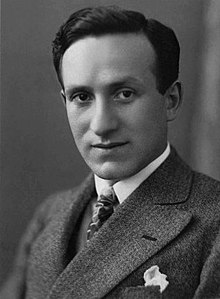Ernő heirstone
Ernő Erbstein or Ernest Egri-Erbstein (born May 13, 1898 in Nagyvárad , Austria-Hungary , † May 4, 1949 in Turin , Italy ) was a Hungarian football player and football coach . As a consultant and trainer, he was instrumental in the success of the Grande Torino in the 1940s.
Player career
Erbstein's football career began when he moved to Budapest for his school education and joined the football section of the Budapesti AK . He made his debut at the BAK at the age of 17 in 1915, where he was mainly used in the runner series . The club was a medium-sized company, which occasionally also played against relegation. In 1921 the BAK was no longer able to hold its own in the top division and from then on played in the second division, where it was not successful in the following years. Erbstein stayed with the club until 1924, before moving abroad like many Hungarian players at that time.
He first played one season at Olympia Fiume, a forerunner of the US Fiumana, in the port city of Fiume, which has been part of Italy since the Treaty of Rome . In 1925 he moved to the second list AC Vicenza , where he also played only one season before the provisions of the Carta di Viareggio prohibited the use of non-Italian players in national football.
Erbstein moved to Palestine , where an association of Hungarian-Jewish professional players had been founded. With this team he undertook a US tour of several months in 1927 . He later played in the American Soccer League for the Brooklyn Wanderers .
Coaching career
After returning to Europe , Erbstein began his coaching career in Italy in 1928 (foreign coaches were still allowed in contrast to foreign players). First he looked after the lower class AS Bari and ASG Nocerina , before he took over CS Cagliari in 1930 and rose to Serie B in the first year.
After another season in Bari, Erbstein was coach of US Lucchese Libertas in 1933 , with whom he rose from third to first division within three years and established the Tuscan club with a seventh place in midfield of Serie A. At Lucchese he brought out the future Italian world champion goalkeeper Aldo Olivieri and when Erbstein received the offer in 1938 to take over the coaching position at AC Turin , he took the player to his new club.
In Turin, Erbstein quickly won the trust of club president Ferruccio Novo and finished second at the end of the season. The introduction of the Italian race laws forced Erbstein to leave the country and he returned to Budapest, where he remained in constant contact with Novo and especially advised him on player purchases. AC Turin built a team around the new signings Valentino Mazzola and Ezio Loik that dominated Italian football in the 1940s and went down in history as Grande Torino .
After the end of the Second World War , Erbstein returned to Turin , where he first acted as a consultant and then as the technical director of the team that won three championship titles in a row during this time. In 1948 he took over the training of the team again together with the Englishman Leslie Lievesley . Also in this season the championship title succeeded and in May 1949 the team played a friendly game in Lisbon . On the return flight, the aircraft drifted off course in the landing approach in thick fog and crashed on the hill of Superga . Like the entire team, Erbstein was killed in this Superga plane crash .
literature
- Dominic Bliss: Erbstein: The Triumph and Tragedy of Football's Forgotten Pioneer . Blizzard Books, 2014
Web links
- Luciano Luciani: “Lucchese anni Trenta”. La 'semina' sportiva e umana di uno straordinario allenatore, Ernest Erbstein , with a portrait photo, on recensione.blogspot, April 6, 2011
- Ernő Egri Erbstein: Tragic tale of Jewish soccer hero who defied Nazis
- Dominic Bliss: The story of Ernö Erbstein, who survived Hungary's Holocaust to coach Torino , The Guardian, January 22, 2015
| personal data | |
|---|---|
| SURNAME | Erbstein, Ernő |
| ALTERNATIVE NAMES | Egri-Erbstein, Ernest |
| BRIEF DESCRIPTION | Hungarian football player and coach |
| DATE OF BIRTH | May 13, 1898 |
| PLACE OF BIRTH | Nagyvárad , Austria-Hungary |
| DATE OF DEATH | May 4, 1949 |
| Place of death | Turin |
